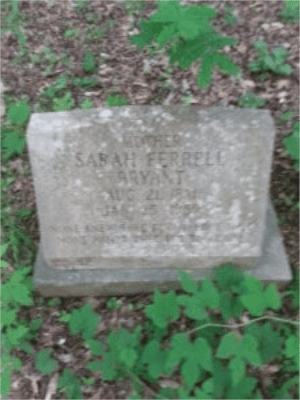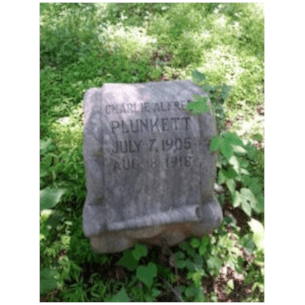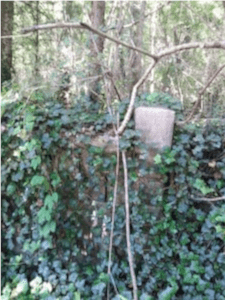This is an updated republication of an article we published in May of 2016. With the Chattahoochee RiverLands project underway, we hope restoring this beautiful but neglected cemetery on Chattahoochee tributary Proctor Creek is taken on.
This is the third installment in a series on the history and current state of Atlanta’s Hollywood Cemetery.
The sexton in a cemetery has an important, but usually routine, job. Depending on the size of the staff, a sexton might be in charge of maintaining the grounds, keeping records of burials, opening and closing graves during interment, making sure headstones are placed on the correct graves, and carrying out a number of other practical tasks related to the operation of the cemetery.

Sextons do not usually appear in newspaper headlines. But W.A. Peters, the sexton of Hollywood Cemetery as the 19th century gave way to the 20th, was the frequent topic of news headlines. If a chaotic dispute, physical altercation, or legal conflict occurred in or near the cemetery while he held his post, it was a near certainty he was in the middle of it.
Between 1898 and 1903, in separate incidents, he was jailed on accusations of “cheating and swindling”, was badly beaten, and was the subject of multiple lawsuits, both as the plaintiff and defendant.
William A. Peters, usually called “W.A.” in newspaper accounts, was born in Gwinnett County in 1855, to Fleming and Margaret Peters. Fleming Peters was a coroner. William married Shadie Cain in 1886. By 1894 Peters was the sexton of Hollywood Cemetery and he and his wife were living on cemetery property.

On a Monday in late August of 1898, Peters had a fight with a railroad switchman named John Sexton (an ironic name, since Peters was a sexton). Sexton was living in a shack near Hollywood Cemetery with his wife and small child. He claimed that Peters tried to evict him from the property and take ownership of the land, and that Peters had spoken to Sexton’s wife abusively in the course of the attempted eviction.
Sexton and Peters met on a road near the cemetery. The details of what happened next are disputed. Sexton claimed that Peters hit him with a tin bucket, and showed a reporter a wound on his face as evidence. Friends of Peters claimed that Sexton used brass knuckles in the fight. a claim that Sexton denied.
But an undisputed fact is that Peters was seriously injured in the fight, and Sexton went to jail. The Atlanta Constitution’s headline on August 24, 1898 was “ONE MAY DIE; THE OTHER IS IN A CELL … May Result in a Murder Trial.” The newspaper didn’t run a followup story, so it’s unclear what the legal outcome was for Sexton, but Peters evidently didn’t die, because he went on to participate in a number of other adventures.

A year later, in September of 1899, he was involved in another dispute, a complicated three-way conflict over a body that was moved from one grave to another. At this point Peters wasn’t acting as the cemetery’s sexton (although in subsequent years he reappeared as the sexton of Hollywood Cemetery) but as the seller of a plot, and as a freelance gravedigger.
A man named C.D. Saye decided to move his sister from a plot at Hollywood Cemetery that he found unsuitable, and to hold a funeral after her body was moved to a new location. After selling Saye the lot, Peters acted as gravedigger.
During the funeral, C.E. Smith, the current sexton of the cemetery, interrupted them and told them they didn’t have the proper permit to remove or inter a body. An argument ensued between Smith on the one hand, and Saye, a friend of his named W.M. Walpert, and their wives on the other.
Smith took out warrants on Peters, Saye, and Walpert, and they were arrested and jailed during the funeral. Later in the day the charges were dismissed, they were released, and returned to the cemetery to continue with the funeral.
Peters and Saye each sued the Hollywood Cemetery Company and Smith for $5,000. The jury in the trial ruled in favor of the company, but awarded Peters $145 in damages.
Despite the lawsuit Peters filed against the Hollywood Cemetery Company, he became sexton of the cemetery once again, and was embroiled in a racially charged case before a Fulton County judge in May of 1901.
Frank Meyers, the receiver of the estate of a man named J.C. Baird, claimed that Peters was selling plots to African-Americans on land that was properly part of the Baird estate, and that Peters was conducting ongoing burials there. Peters and Hollywood Cemetery Company claimed that the property was owned by them. Peters said that he intended to continue the burials. The judge issued a temporary restraining order against him pending the outcome of the case. No outcome of the property dispute was reported in the paper, but Meyers, who had requested the restraining order, asked that the order be rescinded the next day.
In 1902 Peters was arrested for criminal trespass. R.M. Wylie claimed that Peters and another Hollywood Cemetery employee, Mac Vaughn, had begun burying African-Americans on Wylie’s land.
In August of 1903, W.A. Peters was again in trouble with the law, this time for “swindling.” Two women, Annie Varandoe, and R.H. Robinson, had him arrested for selling them both the same cemetery plot.
After that arrest, Peters seemed to avoid brushes with the law, and disappeared from the headlines. He moved to Gwinnett County at some point before the 1910 federal census, and died there in 1921. He and his wife Shadie, who died a year later in 1922, are buried at the Friendship Primitive Baptist Church cemetery in Snellville.
I’ve only presented a brief sample of the drama that followed Peters. Two stories involving Peters require much longer treatment, and will be published in future articles in this series.
The next installment in this series will feature a locally notorious outlaw who is buried in Hollywood Cemetery.
